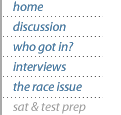 | 
When it was first administered to a group of students, in 1926, (read about
this first test and try some of its questions) the SAT was called
the Scholastic Aptitude Test, the word "aptitude" meaning that the test
measured an innate ability, rather than knowledge acquired through schooling.
Today, the test administered by the College Board is still called SAT, but the
name is just an acronym, with the letters no longer standing for anything. This
fact illustrates the uncertainty that has surrounded what exactly the SAT
measures (we are referring only to the SAT I: Reasoning Test, not to the SAT II
Subject Tests).
The design of the SAT was based on the IQ test (see historical
timeline) The French psychologist Alfred Binet created the first test of
intelligence in 1905. It was to be used to identify slow learners so that
teachers could give them special attention. This test would later be known as
the IQ test--IQ standing for "intelligence quotient," or the ratio of mental to
physical age.
Because the SAT was devised as a tool to identify talented students from
underprivileged backgrounds, it was thought of as a test that would measure an
innate ability referred to as "aptitude," rather than abilities that these
students might have developed through school.
"When these tests were originally developed," said Harvard social policy
professor Christopher Jencks, "people really believed that if they did
the job right they would be able to measure this sort of underlying, biological
potential. And they often called it aptitude, sometimes they called it genes,
sometimes intelligence."
According to the College Board, the SAT now does not measure any innate
ability. Wayne Camara, Director of the Office of research at the College Board
told FRONTLINE that the SAT measures "developed reasoning," which he described
as the skills that students develop not only in school but also outside of
school. He pointed out, for example, that students who read a lot, both in and
out of school, are more likely to do well on the SAT and in college. The
College Board says that the best way to prepare for the SAT is to read a lot
and to take rigorous academic courses.
The SAT has been found to correlate with first-year college grades. But
psychologist Claude Steele pointed out that the test has been found to
measure only about 18 percent of the things that it takes to do well in school,
and thus is not a very good predictor of how a student will do in college. "The
SAT is not going to get you very far with predicting who's going to do well in
college," he told FRONTLINE.
Read the views of authorities on intelligence and testing for more on
the SAT's relation to the IQ test, its ability to predict success in school,
and the debate over whether the test measures "aptitude" or "achievement."

home |
discussion |
who got in? |
interviews |
the race issue |
sat & test prep |
history of the sat
the screening process |
test score gap |
getting in to berkeley |
bibliography |
links |
tapes & transcripts |
press |
links
FRONTLINE |
pbs online |
wgbh
 |  |